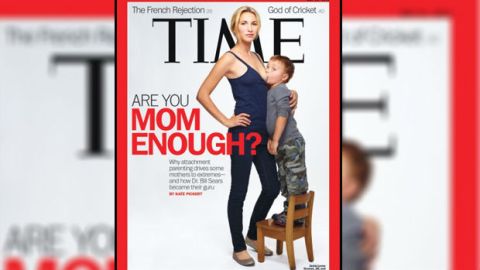“Are You Mom Enough?”

What could be better than starting your morning, visiting your online haunts, and being confronted, bleary-eyed, with a picture of a blonde woman in a catsuit having her breast suckled by an almost 4-year old boy standing on a chair and staring into the camera, under the Mothers-Fighting-Mothers headline, “Are You Mom Enough?”
Time magazine’s cover this week is stirring criticism, on many levels.
Time is profiling “attachment parenting” advocate Will Sears. Basically, Sears believes that moms should be always available to their children physically—they should breastfeed extensively and past infancy, carry babies in slings, sleep with them, and so on.
Some commenters object more to the fact that Time profiled Sears at all than to the cover photo. Other commenters feel that the cover’s distorting some of the good ideas behind attachment parenting with an extreme interpretation of it.
The traditional magazine industry is imploding. To survive, magazines rely most heavily on newsstand sales. Trying to do “shocking” things and making women look like sex objects or idiots—or ideally, both—are ways to draw eyeballs. Newsweek is a prime offender. Remember the “bugged-out Michele Bachmann”, Sarah Palin in a jogging suit and Princess Diana Resurrected for the Royal Wedding covers?
Stoking some of the most gnawing personal anxieties of our time—“Are other mothers better?” “Am I sexy enough?” “Do I have enough sex?” “Is every marriage better than mine?” “Am I a big failure?”— is another way to sell magazines. It’s called pandering.
In a broader cultural context, though, the cover shot is one example of the sexualization of motherhood. Instead of yelling “Girls! Girls! Girls!” to attract business, hucksters now yell, “Moms! Moms! Moms!” “MILFs! MILFs! MILFs!”
Time’s headline itself, “Are You Mom Enough?” is a maternal tweak on the sexual dare, “Are You Woman Enough?”
I don’t have a good hypothesis for why this sexualization is happening. The biggest example is with celebrity baby and pregnancy shots.
For mothers, seeing sexy, beautiful celebrities with their baby bumps or stylishly breastfeeding—incidentally (but I can’t imagine accidentally), the mom on this cover is a model—might conjure the same feelings of inadequacy or insecurity that many girls and women feel when they look at (airbrushed) models in fashion magazines.
Most women I know don’t want to feel as if even when they’re nursing, or pregnant, there’s some implied beauty standard or performance anxiety to worry about. They just want to be mothers, feed their babies, and be supported in their decisions, not pitted against other mothers, or philosophies.
As for men, I’m not sure how these Sexy Mama shots are received. They seem to combine the artistic tradition of the Madonna with the centerfold.
In my book, I have a chapter called “Children: The New Spouses.” I coined the phrase somewhat in jest, and polemically. I was arguing that children today occupy almost a spousal role.
Of course, children have always been a big part of marriage. But before, they were cogs in the machine, and not the whole machine. Now that children have migrated closer to the emotional, intimate, even romantic center of family life, marriage (to say nothing of other roles of adulthood) has become the “forgotten bond.”
Based on this cover, my phrase of children as the “New Spouses” might have been more emotionally accurate than I thought.
In Facebook chatter, I was consoled to see that the conversation between women about this was compassionate, tolerant, and smart.
They saw through the headline’s cynically divisive attempt to re-ignite the damp kindling of the motherhood wars. “Just what we need,” one writes. “More moms against moms.”
They rejected the invitation to torture themselves with more gnawing anxiety about who’s better as a mother.
Motherhood performance anxiety is like the Red Scare. You can always drum up fear around it. Like the 1910s poster, you can stoke the idea of an enemy within: “Is Your Bathroom Breeding Bolsheviks?/Bad Mothers?”
For antidotes to scare tactics, read Ayelet Waldman’s wonderful book, Bad Mother, and Lenore Skenazy’s Free RangeKids.
Women in my modest Facebook sample also wondered whether this isn’t a case of a parenting philosophy being used to fulfill the complex emotional and psychological needs of the mother, and I think that’s a wise question to ask. It’s a good question to ask of ourselves in many parental circumstances, actually.
And, as to the question, “Are You Mom Enough?” Probably not but, as psychoanalyst D.W. Winnicott famously said of mothering, I am “Good Enough,” and that’s plenty.





